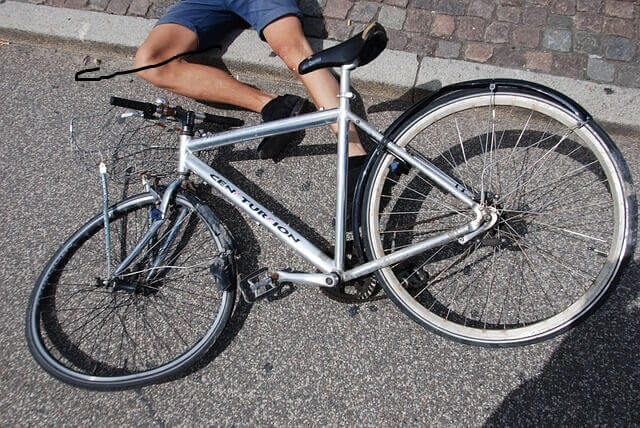Understanding bicycle accident compensation after being knocked off your bike
Getting knocked off your bike can be a traumatic experience, both physically and emotionally. However, it’s essential to stay focused and take the necessary steps to ensure you receive proper compensation for your injuries and bike damages. In this article, we’ll guide you through the process of maximizing your compensation after such an incident.
According to Government statistics, in 2022, 91 cyclists lost their lives in Great Britain and 4.056 were seriously injured and 11,546 sustained more minor injuries
When dealing with insurance companies and legal procedures, it’s crucial to have a clear understanding of your rights and the steps you need to take. Our expert advice will provide you with the knowledge and confidence to navigate through the complexities of the claims process, ensuring you receive the compensation you deserve.
From gathering evidence and documenting your injuries to dealing with insurance adjusters and negotiating a fair settlement, we will arm you with the information needed to advocate for yourself effectively. We’ll also explore additional avenues for compensation that you may not have considered.
No one should have to bear the financial burden of medical expenses and bike repairs caused by someone else’s negligence. With our comprehensive guide, you can assert your rights and maximize your compensation, allowing you to get back on your bike with confidence.
The Steps to take after being knocked off your bike
Bicycle accidents can result in severe injuries and property damage for which you deserve compensation after being knocked off your bike. Understanding how compensation works in these cases is essential to ensure you receive the appropriate amount for your losses.
When it comes to bicycle accident compensation, there are a few key factors to consider. First, liability must be established. This means determining who is at fault for the accident. In most cases, the at-fault party’s insurance will be responsible for compensating you.
Next, it’s crucial to understand the types of compensation you may be eligible for after being knocked off your bike.. These can include medical expenses, pain and suffering, lost wages, property damage, and future medical costs. By understanding the different components of compensation, you can ensure that you are adequately reimbursed for your losses.
Finally, it’s important to be aware of any time limitations for filing a claim. The Limitation Act 1980, determine how long you have to initiate legal action. Failing to file within the designated time frame can result in the forfeiture of your right to compensation.
Gathering evidence for your compensation claim
Immediately after a bicycle accident, it’s crucial to take certain steps to protect your rights and maximize your chances of receiving fair compensation. By following these steps, you can ensure that you have the necessary evidence to support your claim.
The first step is to seek medical attention. Even if you believe your injuries are minor, it’s important to get a professional evaluation. Some injuries may not be immediately apparent, and a medical report can serve as crucial evidence in your case.
Next, you should document the accident scene and gather as much evidence as possible. Take photos of the location, any visible injuries, and the damage to your bike. If there were witnesses to the accident, collect their contact information as well. This evidence will help establish liability and strengthen your claim.
After documenting the accident, it’s essential to report it to the appropriate authorities. Contact the police and file an accident report, providing them with all the necessary details. This official report will serve as valuable evidence and can help support your claim.
Calculating your compensation
To maximize your compensation after being knocked off your bike, you need to gather strong evidence to support your claim. This evidence will help establish liability and demonstrate the extent of your injuries and damages.
One of the most crucial pieces of evidence is witness statements. If there were any witnesses to the accident, reach out to them and ask for a written statement describing what they saw. Witness statements can provide an unbiased account of the accident and can significantly strengthen your claim.
Additionally, medical records and bills are essential for documenting your injuries and treatment. Make sure to keep copies of all medical documentation related to the accident, including doctor’s notes, test results, and receipts for medications or therapies. These records will help establish the link between the accident and your injuries.
Photographic evidence is also highly valuable. Take pictures of your injuries immediately after the accident and throughout your recovery process. If there is visible damage to your bike or other property, document it with photographs as well. Clear, high-quality images can provide undeniable proof of the extent of your losses.
What are the common types of bicycle accident injuries? What are the average settlement amounts?
Most bicycle accidents involve fractures, head injuries or soft tissue injuries or a combination of all these.
How much could I receive for a head injury ?
Head And Brain Injury?
Minor injuries to the head:
£1,500 – £8,000
Temporary but significant psychiatric damage and/ or distress:
£1,000 – £10,000
Minor brain damage:
£10,000 – £28,000
Permanent and severe psychiatric damage effecting ability to work:
£40,000
Permanent and psychiatric damage:
£75,000
Moderately severe:
£140,000 – £180,000
Severe psychiatric damage:
£180,000 – £250,000
How much could I receive for a shoulder injury ?
Shoulder Injury
Serious shoulder Injury:
£15,000 – £38,000
very significant shoulder Injury:
£10,000+
Moderate shoulder injury:
£7,500 – £10,000
fractured clavicle:
£4,000 – £10,000
Minor shoulder injury which recover over a period of weeks/ months:
£1,500 – £6,000
How much will I receive for an arm injury?
Loss of both arms:
£201,300 – £250,800
Severe arm injury:
£80,410 – £109,450
Severe elbow injury:
£13,090 – £26,790
How much will I receive for a leg injury
Leg Injury
Loss of use of both legs:
£150,000+
Loss of use of one leg:
£65,000
Injury to one leg depending on the severity, recovery time, age of victim and residual use/disability:
£1,000 to £75,000
Typical awards for a broken leg with full recovery:
£5,000
The above amounts give you an idea of how much you may receive but will vary according to the type of injury you have sustained, whether there are multiple injuries and whether your future earnings capacity is affected. You may wish to speak to one of our experienced personal injury lawyers to get a better idea of the sums involved.
Calculating the appropriate compensation for a bicycle accident can be complex. Numerous factors come into play, including
- medical expenses,
- property damage,
- lost wages,
- and pain and suffering.
Understanding how these factors are evaluated can help you estimate the amount you may be entitled to.
Medical expenses typically include the costs of emergency room visits, hospital stays, surgeries, medications, and ongoing treatments. It’s important to keep track of all medical bills and expenses related to the accident. These costs will be factored into your compensation claim.
Property damage refers to the cost of repairing or replacing your bike, as well as any other damaged personal belongings. If your bike was significantly damaged or totaled, you may be entitled to receive compensation for its fair market value.
Lost wages account for the income you have missed out on due to the accident. If your injuries prevented you from working or required you to take time off, you can include the wages you would have earned during that period in your compensation claim.
Pain and suffering compensation is more subjective and can vary greatly depending on the severity of your injuries and their impact on your life. This type of compensation aims to compensate you for physical pain, emotional distress, and any reduced quality of life resulting from the accident.
Working with a personal injury lawyer
Bicycle accidents can result in a wide range of injuries, some of which can have long-term consequences. It’s important to be aware of the most common types of bicycle accident injuries and how they can impact your compensation claim.
Head injuries, including concussions and traumatic brain injuries, are among the most serious injuries that can occur in bicycle accidents. These injuries can have long-lasting effects on your cognitive function and overall well-being. It’s crucial to seek immediate medical attention if you experience any head trauma.
Fractures and broken bones are also common in bicycle accidents. Wrist fractures, collarbone fractures, and hip fractures are particularly prevalent. These injuries often require surgery and extensive rehabilitation, which can significantly impact your compensation claim.
Soft tissue injuries, such as sprains, strains, and bruises, are also common in bicycle accidents. While they may not be as severe as fractures or head injuries, they can still cause pain and discomfort, requiring medical treatment and impacting your daily life.
Spinal cord injuries are some of the most severe and life-altering injuries that can occur in bicycle accidents. These injuries can result in partial or complete paralysis, requiring ongoing medical care and adaptive equipment. Compensation for spinal cord injuries is typically substantial due to the long-term impact on the victim’s life.
Negotiating with insurance companies for fair compensation
Navigating the legal complexities of a bicycle accident compensation claim can be overwhelming. Hiring a personal injury lawyer who specializes in bicycle accidents can greatly increase your chances of receiving fair compensation.
A personal injury lawyer will have the expertise and experience to guide you through the entire process. They will handle the legal paperwork, communicate with insurance companies, and negotiate on your behalf. Having a lawyer by your side ensures that your rights are protected and that you have the best chance of maximizing your compensation.
When choosing a personal injury lawyer, look for someone with a proven track record in bicycle accident cases. They should have a deep understanding of the laws and regulations specific to your jurisdiction and be able to provide references from satisfied clients.
Additional factors that may affect your compensation
Dealing with insurance companies can be challenging, as their primary goal is to minimize their own costs. To ensure you receive fair compensation, it’s crucial to approach negotiations with a well-prepared strategy.
First, gather all the evidence and documentation related to your case. This includes medical records, bills, witness statements, and photographs. Having this evidence organized and readily available will strengthen your position during negotiations.
Next, be prepared to make a compelling argument for your compensation claim. Clearly articulate the extent of your injuries, the impact they have had on your life, and the financial losses you have incurred. Presenting a strong case with supporting evidence will increase your chances of receiving a fair settlement.
It’s important to remember that insurance companies may try to offer a low initial settlement. Don’t accept the first offer without carefully reviewing it. Consult with your personal injury lawyer to determine if the offer is fair based on the extent of your injuries and losses.
Resources for bicycle accident victims
Several factors can impact the amount of compensation you receive after being knocked off your bike. Understanding these factors can help you better navigate the claims process and negotiate for a fair settlement.
Contributory negligence is one such factor. If it is determined that you were partially at fault for the accident, your compensation may be reduced. Each case will be determined on its facts regarding contributory negligence, so it’s important to consult with your personal injury lawyer to understand how it may affect your case.
Finally, pre-existing injuries or conditions can complicate your compensation claim. Insurance companies may try to argue that your injuries were pre-existing and not caused by the accident. It’s important to provide medical records and evidence that clearly demonstrate the link between the accident and your current injuries.
Conclusion: Taking action for fair compensation after a bicycle accident
If you’ve been knocked off your bike and are seeking compensation, there are various resources available to help you navigate the claims process and protect your rights.
Local bicycle advocacy organizations can provide valuable support and guidance. They often have resources specifically tailored to bicycle accident victims.
Online forums and communities can also be a great source of information and support. Connecting with other bicycle accident victims who have gone through the claims process can provide valuable insights and tips.
Additionally, the citizens advice bureau or local law centre may offer free or low-cost legal assistance to individuals who cannot afford to hire a personal injury lawyer. These organizations can help ensure that you have access to legal representation and can advocate for your rights effectively.
Here at Grieves Solicitors, Personal Injury Specialists, we offer a no win, no fee solution to funding your claim (a conditional fee agreement) which means that you do not have to worry about legal costs and expenses. You can read about our no win, no fee agreement here.
Let us help you





